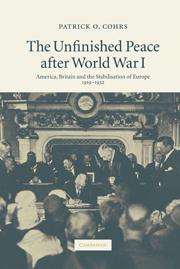Book contents
- Frontmatter
- Contents
- Acknowledgements
- List of abbreviations
- A note on the footnotes and bibliography
- Introduction
- Prologue
- 1 The wider challenges
- 2 Wilson, Lloyd George and the quest for a ‘peace to end all wars’
- 3 The ill-founded peace of 1919
- 4 The escalation of Europe's post-Versailles crisis, 1920–1923
- Part I The Anglo-American stabilisation of Europe, 1923–1924
- Part II Europe's nascent Pax Anglo-Americana, 1924–1925
- 11 The dawning of a Progressive Pax Americana in Europe?
- 12 Towards the Locarno pact
- 13 Regression?
- 14 Beyond irreconcilable differences?
- 15 The path to Locarno – and its transatlantic dimension
- 16 The second ‘real’ peace settlement after World War I
- Part III The unfinished transatlantic peace order: the system of London and Locarno, 1926–1929
- Epilogue
- Conclusion
- Map: Post-World War I Europe after the peace settlement of Versailles
- Bibliography
- Index
13 - Regression?
US policy and the ‘political insurance’ of Europe's ‘economic peace’
Published online by Cambridge University Press: 21 July 2009
- Frontmatter
- Contents
- Acknowledgements
- List of abbreviations
- A note on the footnotes and bibliography
- Introduction
- Prologue
- 1 The wider challenges
- 2 Wilson, Lloyd George and the quest for a ‘peace to end all wars’
- 3 The ill-founded peace of 1919
- 4 The escalation of Europe's post-Versailles crisis, 1920–1923
- Part I The Anglo-American stabilisation of Europe, 1923–1924
- Part II Europe's nascent Pax Anglo-Americana, 1924–1925
- 11 The dawning of a Progressive Pax Americana in Europe?
- 12 Towards the Locarno pact
- 13 Regression?
- 14 Beyond irreconcilable differences?
- 15 The path to Locarno – and its transatlantic dimension
- 16 The second ‘real’ peace settlement after World War I
- Part III The unfinished transatlantic peace order: the system of London and Locarno, 1926–1929
- Epilogue
- Conclusion
- Map: Post-World War I Europe after the peace settlement of Versailles
- Bibliography
- Index
Summary
After the London settlement there was indeed an underlying continuity in the ‘Progressive’ approach to European stabilisation that Wilson's successors championed. Yet there was also a marked reorientation, or more precisely a regression, in the State Department's efforts to develop strategies to secure Europe's economically underpinned Pax Americana. Continuity was accentuated by the fact that Ambassador Kellogg, designated to succeed Hughes in January 1925, unequivocally endorsed the principles laid down by his predecessor.
On 7 October 1924, Kellogg had outlined to Coolidge what was to become the credo of his policy. He stressed that he realised ‘how much more influence we will have if we maintain our freedom of action, at the same time co-operating in the friendliest spirit with a desire to help’ the Europeans. He did not believe that the administration ‘could have accomplished so much in the Dawes Plan settlement if we had been parties in the League, the sanctions, and tied up in European politics’. To the detriment of further advances in transatlantic co-operation, Kellogg felt that Europe's consolidation had progressed so far that he could exercise even more restraint than Hughes in fostering peaceful change. In his judgement, there was no structural or pressing security problem demanding US attention, neither in 1925 nor thereafter.
Heeding the advice of his mentor, Senator Borah, who vehemently opposed any US entanglements in Europe, Kellogg never even tried to develop, and legitimate vis-à-vis Congress, a more engaged European policy.
- Type
- Chapter
- Information
- The Unfinished Peace after World War IAmerica, Britain and the Stabilisation of Europe, 1919–1932, pp. 220 - 226Publisher: Cambridge University PressPrint publication year: 2006



